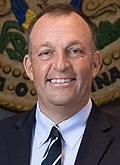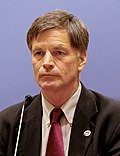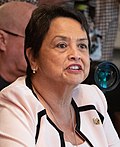
| This article is part of a series on the |
| State governments of the United States |
|---|
 |
| Executive |
|
| Legislative |
(Alabama to Missouri, Montana to Wyoming) |
| Judiciary |
| Local offices |
| |
The United States has 50 states and 5 territories that each elect a governor to serve as chief executive of the state or territorial government. [1] The sole federal district, the District of Columbia, elects a mayor to oversee its government in a similar manner. [2] [3] In the event of a vacancy, the governor is succeeded by the second-highest-ranking state official; in 45 states and 4 territories, the lieutenant governor is the first in the line of succession. [4] [5]
Contents
As of January 2026 [update] , there are 26 states with Republican governors and 24 states with Democratic governors. [6] The Democratic Party controls two territorial governorships, the Republican Party controls one, and one is an independent.[ citation needed ] Jenniffer González-Colón of Puerto Rico is a member of the New Progressive Party, although she is also affiliated with the Republican Party. [7] The federal District of Columbia is governed by a Democratic mayor. [8]
The current gubernatorial term ends and new term begins in January for most states and territories, two months after their election; in Alaska, Hawaii, North Dakota, and Kentucky, the term begins in December. [9] [10] Governors serve four-year terms in most states and all territories; New Hampshire and Vermont have two-year terms for their governors. Most states and all but one territory also have term limits that generally allow for two consecutive terms to be served by a candidate. To run for governor, a candidate must generally be a U.S. citizen with prior state residence who meets the minimum age requirement—set at 30 years old in 35 states. [11]
All 55 governors are members of the National Governors Association, a non-partisan organization which represents states and territories in discussions with the federal government. [12] Other organizations for governors include the partisan Democratic Governors Association and Republican Governors Association; and the three regional associations: Midwestern, Northeastern, and Western. [13]























































